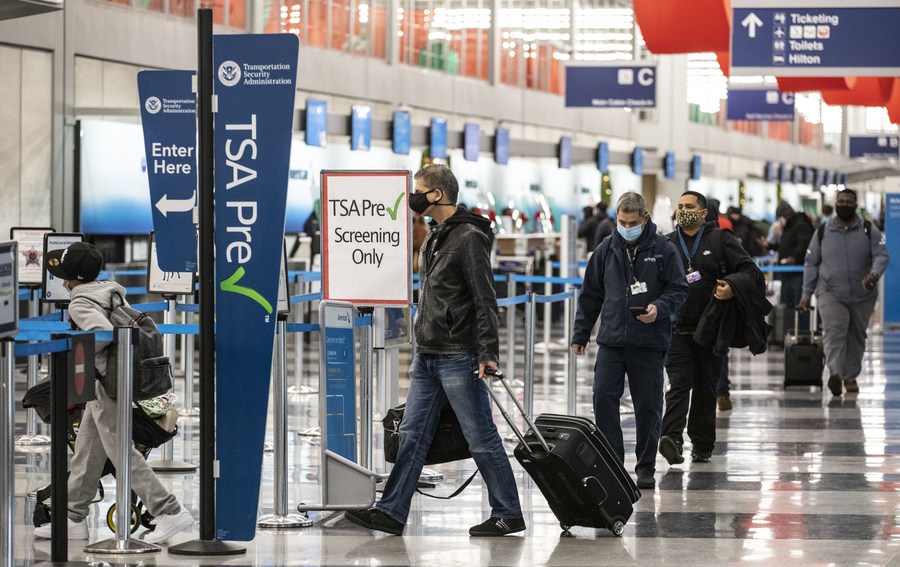Biden unveils major infrastructure plan amid opposition to tax hike

Photo taken in Arlington, Virginia, the United States, on March 31, 2021 shows a screen displaying U.S. President Joe Biden delivering a speech in Pittsburgh, Pennsylvania in a live stream provided by CNBC. (Xinhua/Liu Jie)
To offset the plan's massive costs, Biden proposed increasing the corporate income tax rate to 28 percent, up from the current 21 percent, attempting to partially reverse the tax cuts under the Donald Trump administration.
WASHINGTON, April 1 (Xinhua) -- U.S. President Joe Biden on Wednesday unveiled a 2-trillion-U.S.-dollar infrastructure plan, touting it as a "once-in-a-generation" investment in America and proposing a corporate tax hike to offset the cost.
The plan, widely welcomed by Democrats, is expected to face a tough fight in Congress, as Republicans have flatly rejected any increase in taxes. Meanwhile, concerns over mounting debt and inflationary risks are expected to further complicate the plan's prospects.

Travelers wearing face masks line up for security checks at O'Hare International Airport in Chicago, the United States, on Nov. 25, 2020. (Photo by Joel Lerner/Xinhua)
REVIVING "CRUMBLING" INFRASTRUCTURE
The proposal, dubbed the American Jobs Plan, includes 621 billion dollars to improve transportation infrastructure, such as roads, bridges and airports, with 174 billion dollars allocated to electric vehicles.
The plan also sees 300 billion dollars earmarked to revitalize American manufacturers and small businesses, 213 billion for housing, 180 billion to boost the country's research and development, 100 billion in high-speed broadband, and 100 billion to modernize schools and early learning facilities.
"What I am proposing is a one time capital investment of roughly 2 trillion dollars in America's future, spread largely over eight years," Biden said in a speech in Pittsburgh, Pennsylvania, where he kicked off his presidential campaign.
"It will generate historic job growth, historic economic growth, help businesses to compete internationally, create more revenue as well," Biden said, noting that among the highest-value investments would be in America's "crumbling" infrastructure.
According to the American Society of Civil Engineers, the country's infrastructure scores a C minus, with 43 percent of public roadways in poor or mediocre condition, and 7.5 percent of the nation's bridges "structurally deficient."
"Unfortunately, we have been underinvesting in our infrastructure for decades. In 2019, the U.S. spent just 2.5 percent of our GDP on infrastructure, down from 4.2 percent in the 1930s," said the organization, adding that the COVID-19 pandemic has made a difficult situation "worse."
Jeffrey Sachs, economics professor at Columbia University and a senior UN advisor, recently told Xinhua that he strongly supports the long-term package, as investing in infrastructure builds "the base of the economy."
"The United States hasn't done this properly in a long time ... The United States needs to focus on infrastructure investment," he said.

Workers remove the blocks around an Apple store on Fifth Avenue during the Phase one reopening in New York, the United States, June 12, 2020. (Xinhua/Wang Ying)
TAX HIKE COULD BE TOUGH SELL
To offset the plan's massive costs, Biden proposed increasing the corporate income tax rate to 28 percent, up from the current 21 percent, attempting to partially reverse the tax cuts under the Donald Trump administration.
The tax reform proposal will also raise the global minimum tax on U.S. multinational corporations from 10.5 percent to 21 percent, in a bid to discourage offshoring and create incentives for investment in the United States.
Biden's proposal is widely welcomed by Democrats, with Senate Majority Leader Chuck Schumer and Elizabeth Warren quickly voicing support.
Republicans lashed out at the plan.
"Rolling back Right to Work laws. Imposing the biggest new tax hikes in a generation -- killing jobs and slowing wage growth when workers need a fast recovery," said Senate Minority Leader Mitch McConnell in a tweet, who recently said that he thinks no Republican would vote in favor of raising taxes to pay for the infrastructure plan.
Within the Democratic Party, consensus is not yet in place.
Joe Manchin of West Virginia has indicated support for raising the corporate tax rate to 25 percent, while Democrat Alexandria Ocasio-Cortez argued that the 2-trillion-dollar plan is "not nearly enough."
"Just as difficult as financing the project will be garnering political support in a U.S. Senate that is controlled by Democrats under a 50-50 split," Joseph Brusuelas, chief economist at accounting and consulting firm RSM US LLP, wrote in an analysis.
Brusuelas said without any significant GOP support, Democrats will need to use budget reconciliation to move the legislation, a procedure adopted to pass the 1.9-trillion-dollar relief bill in the Senate with a simple majority, instead of the 60-vote threshold.

U.S. dollar banknotes, coins and an image of White House are arranged for a photograph in Washington D.C., the United States, on Aug. 20, 2019. (Xinhua/Liu Jie)
FISCALLY RESPONSIBLE?
Biden said his tax policies would add up to more than what he has proposed to spend in just 15 years. "It's honest. It's fiscally responsible," said the U.S. president, noting that it reduces the federal debt over the long haul.
"It is a matter of concern that Mr. Biden is planning to raise taxes over a 15-year period to pay for an eight-year expenditure plan. This implies that his plan would further add to the already unusually large U.S. budget deficit," Desmond Lachman, resident fellow at the American Enterprise Institute and a former official at the International Monetary Fund, told Xinhua via email on Wednesday.
"That could heighten the risk of overheating and add fuel to the increase in long term U.S. Treasury bond yields that could be disruptive to financial markets," Lachman added.
Maya MacGuineas, president of the Committee for a Responsible Federal Budget, a U.S. watchdog group, argued that "we are becoming dangerously numb to borrowing massive amounts of money."
MacGuineas noted that the country borrowed nearly 5 trillion dollars before the crisis for tax cuts and spending increases that were "not justified," and has taken on more than 5 trillion dollars in debt to fight COVID-19 since the start of the pandemic.
In the coming weeks, Biden is expected to unveil another major spending plan focused on expanding health care, child care and education. The two packages combined could cost over 3 trillion dollars, according to U.S. media reports.
Photos
Related Stories
- Biden says 90 pct of adult Americans eligible to be vaccinated in 3 weeks
- Biden faces tough choices in Afghanistan as troop withdrawal deadline nears
- Biden attempts to repair transatlantic relations as EU leaders struggle to control COVID-19 resurgence
- Biden announces new goal of 200 mln vaccine doses in 100 days
- Biden under pressure to take action on gun control after two mass shootings
Copyright © 2021 People's Daily Online. All Rights Reserved.










